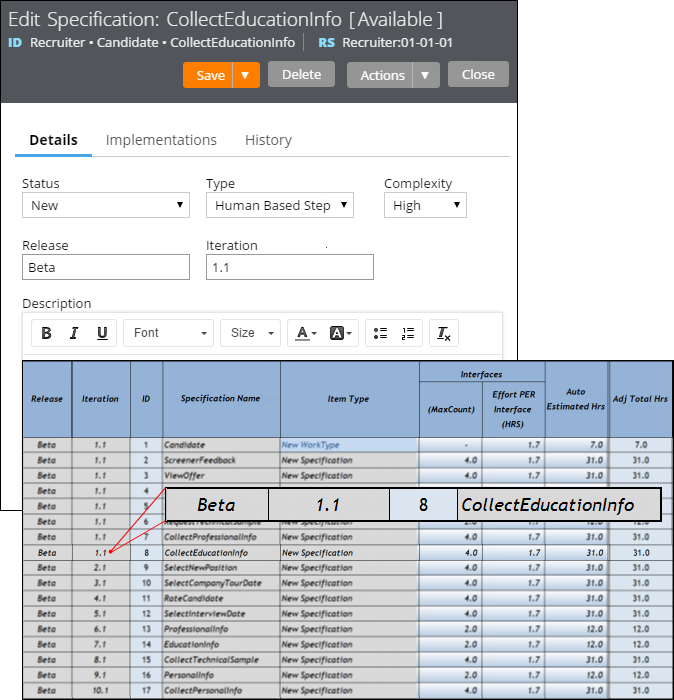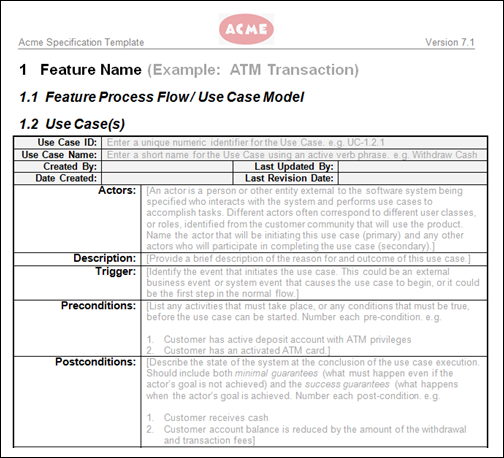Tracked changes persist between client sessions
Valid from Pega Version 7.1.7
The Microsoft Word native change tracking feature persists between client sessions for specifications. Enable this feature to facilitate collaborative reviews of your specifications with project stakeholders.
Inserting your specification updates as tracked changes allows you to:
- Provide visible markup to the next reviewer.
- Correlate edits to a specific user and time.
- Generate documents that include markup and comments.
Local settings, such as the colors you specify for markup, do not persist between clients.
For instructions on how to prevent markup and comments from appearing in generated documents, see Advanced options for editing specifications.
Add multiple attachments at once
Valid from Pega Version 7.1.7
You can now add more than one attachment to a requirement or specification at a time, without closing the Add/Edit Attachment modal dialog box. Use the traditional browse method to upload an attachment or drag and drop a local file, based on your needs. View and access your attachments from the Application Profile landing page, Requirement form, or Specification form.
Plan projects using release data
Valid from Pega Version 7.1.7
Requirements and specifications can now be mapped to a target release and iteration within a specific release. Populating these fields allows you to set and publish a release schedule through worksheets generated by the Sizing wizard. Access these fields from the Application Profile landing page or by opening any requirement or specification.

The Release and Iteration fields as they appear in a specification and a corresponding worksheet
The Sizing wizard incorporates values from the Release and Iteration fields for specifications only.
Specification type extended for decisioning users
Valid from Pega Version 7.1.7
Specifications now support a Decision Strategy Manager (DSM) type. This allows you to map your specifications to a decisioning component, such as a strategy or model. After you select an appropriate subtype and provide relevant metadata, you can run the Sizing wizard to incorporate these details into project sizing worksheets.

DSM specification details as they appear in the Specification form and Sizing wizard output
You must have access to Decision Management rulesets to create DSM specifications. For more information on specification types, refer to the Details tab of the Specification form. To view all specifications in your application, filtered by type, refer to the Application Profile landing page.
Add collections as linked implementations
Valid from Pega Version 7.1.7
You can now identify a collection or individual steps within a collection as an implementation of a specification. Linking specifications to rules allows you to more accurately convey your application design to project stakeholders. Use the Specifications tab on the Collection form to create these links.
To see all implementations for a given specification, refer to the Application Profile landing page or the Implementations tab of the Specification form.
Add project branding to generated documents
Valid from Pega Version 7.1.7
The standard Word Template for specification descriptions is now extensible. Using a customized template allows you to brand your generated documents with project-specific elements.
Specialize the Rule-Application-UseCase.pySpecificationDescription rule to:
- Include relevant images such as company logos.
- Define static text.
- Insert dynamic elements by merging clipboard values into field codes.

Generated document with custom company logo
Refer to Advanced options for editing specifications for instructions on how to override this template.
Enabling historical compliance score data
Valid from Pega Version 7.1.9
Project stakeholders can now track the compliance score for an application over time to better understand and manage ongoing development adherence to Pega 7 Platform guardrails. The compliance score history can be displayed on a line graph on the Compliance Score tab of the Application Guardrails landing page. The data is collected daily and displayed in weekly increments, up to four weeks prior to the current date.
For more information, see Guardrails compliance score, Enabling compliance score history, and Compliance score trend reporting.
Application Sizing Wizard worksheet template now includes business impact
Valid from Pega Version 7.1.9
A column for business impact has been added to the project sizing template used by the Application Sizing Wizard. Project owners can now incorporate this assessment into their project sizing.
New Business impact optimization dashboard
Valid from Pega Version 7.1.9
On the Analysis tab of the Application Profile landing page, you can now enable historical specification count and implementation progress by complexity and business impact. On the Business impact optimization dashboard, you can view counts of specifications by complexity and business impact. You can also view counts, by business objective, of specifications that have been implemented and for those not yet implemented. You can filter specifications by release and iteration.
For more information, see Viewing specifications by complexity, impact, and business objective, and Associating project specifications with business impact and complexity.

